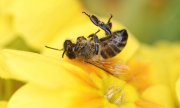Estonia: what can we learn from the dead bees?
Beekeepers in Estonia have sounded the alarm after the death of millions of bees in the country in recent weeks. Government investigations into the first case of mass bee deaths have revealed that the bees were poisoned by a crop protection product used on a field of rapeseed. The Estonian press is shocked and decries modern man's alienation from nature.
Back to Soviet times
The beekeepers' warnings must be heeded, Postimees urges:
“Mass production in agriculture will not disappear. That means: we need better supervision. There can be no cutting costs here. Those who act negligently in this respect must be made to feel the consequences, for example by denying them subsidies. ... The beekeepers' voice may soon become weaker. Nevertheless it should be heeded because their reports could serve as an important warning. We're proud of our local food products, but that can change quickly. After all, who wants a return to Soviet times, when planes sprayed the countryside with herbicides and destroyed our natural environment?”
Disconnected from nature
Maaleht puts the mass death of bees in a larger context and warns of the consequences of technological progress:
“The smartphone cannot be smarter than people. It's not smart, even if it can receive information and will soon even be able to talk to us. GPS devices already talk, but only people can perceive the world. Only people can smell the algae 50 kilometres away and grasp that a breeze is blowing in from the sea. ... The more we trust technology instead of our own intuition, the less active our senses will become, the less human we will be, and consequently the more prone we will become to making mistakes. The inability to respect life around us is the new reality - that's the bitter truth.”

